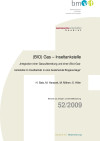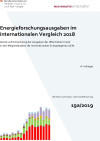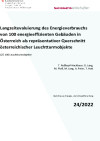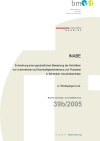Suchergebnisse für "Factsheet: Energietechnologien gestalten, die für alle sinnvoll und nutzbar sind"
Symposium: Energiezukunft unserer Gemeinden
31. Mai 2012
Sonnenplatz 13922 Großschönau, AT
Der TDW Großschönau veranstaltet ein Symposium zum Thema EnergieEinsparung-EnergieEffizienz-ErneuerbareEnergie im Kompetenzzentrum am Sonnenplatz Großschönau.
ERA-Net SUSPRISE: Pilotausschreibung gestartet
Gesucht werden innovative Projekte zu den Themen Wassertechnologien und effiziente Nutzung von Rohmaterialien.
(BIO) Gas - Inseltankstelle

"Integration einer Gasaufbereitung und einer (Bio)-Gastankstelle im Inselbetrieb in eine bestehende Biogasanlage"
Schriftenreihe
52/2009
H. Bala, M. Harasek, M. Miltner, S. Hiller
Herausgeber: BMVIT
Deutsch, 88 Seiten
Downloads zur Publikation
Open Innovation
Instruments and Strategies for the involvement of users and other relevant social groups in the design process: the example of fuel cell technology in end-user markets and wood-plastic composites.
Info-Session MSc "Renewable Energy in Central & Eastern Europe"
22. Mai 2012
Technische Universität WienWien, AT
Im Rahmen einer Info-Session stellt das Continuing Education Center der Technischen Universität Wien den postgradualen Universitätslehrgang "Renewable Energy in Central & Eastern Europe" vor.
Energieforschungsausgaben im internationalen Vergleich 2018

Anteil und Entwicklung der Ausgaben der öffentlichen Hand in den Mitgliedstaaten der Internationalen Energieagentur (IEA).
Schriftenreihe
19a/2019
A. Indinger
Herausgeber: BMVIT
Deutsch, 10 Seiten
Downloads zur Publikation
IEA-EBC Newsletter issue 62, November 2015
Der Newsletter stellt aktuelle Aktivitäten des IEA-EBC-Programms und Trends im nachhaltigen Bauen vor.
Ausstellung: Baufamilien-Tag
28. März 2010
Sonnenplatz Großschönau
Großschönau, AT
Baufamilien-Tag zum Schwerpunktthema "Sanierung mit Passivhaus-Komponenten"
New market potential for Wood Plastic Composites by applications for injection moulding
Wood Plastic Composites (WPC) should gain new market potential and create new value via applications in injection moulding. Therefore it is necessary to develop a formulation suitable for injection moulding to access the existing market potential.
Produktbezogene Umweltinformationssysteme (PUIS)
Das Handbuch "Produktbezogene Umweltinformationssysteme (PUIS) in Theorie und Praxis" ist ab sofort online verfügbar.
Colors of Nature - vegetable dyes in practice
By means of optimization of the production of vegetable dyes and dyeing technology, the vegetable dyestuff "Colors of Nature" will achieve market maturity. In co-operation with farmers and companies of the textile, food processing and wood working industry there has been developed a competitive product throughout the value chain, which will not only yield an ecological advantage, but also generate regional creation of value.
HeinrichBiCool - Climate-positive cooling and biodiversity through intensive greening of buildings
Using the example of an existing building of the University of Graz, currently affected by overheating, the project demonstrates what greening can achieve. Comprehensive monitoring of the indoor climate, building physics, energy requirements and biodiversity before and after the greening measures provides new scientific findings on the actual effectiveness of building greening.
IEA AFC Annex 35: High purity hydrogen production with a 10kWth RESC prototype system (2018)

Demonstration eines Laborprototyps zur dezentralen Herstellung von hochreinem Wasserstoff aus Methan.
S. Bock, R. Zacharias, V. Hacker
Herausgeber: Elsevier, Energy Conversion and Management
Englisch, 10 Seiten
Fachexkursion Flandern: Programm am 14. September 2018
Tag 4 der Exkursion: Antwerp Tommorow
1. Ausschreibung bis 20. September geöffnet
Projektanträge können bei der Forschungsförderungsgesellschaft eingereicht werden. Genauere Informationen und Kriterien entnehmen Sie bitte dem Ausschreibungsleitfaden.
PersonAI - User-Centered AI-based energy services built on personal preference models
Conduct a large-scale, long-term study with 40-50 people to create personal comfort profiles to increase comfort in buildings. The personal comfort profiles will then be fed back into the building control system as input variables in a proof-of-concept.
Diverse DH Pöchlarn - Diversification strategies for a sector-coupled district heating supply in the municipality of Pöchlarn
The project aims to explore the feasibility of maximizing industrial waste heat extraction into the district heating system of the municipality of Pöchlarn so that the defossilization path can be taken further.
Langzeitevaluierung des Energieverbrauchs von 100 energieeffizienten Gebäuden in Österreich als repräsentativer Querschnitt österreichischer Leuchtturmobjekte (LZE 100 Leuchtturmobjekte)

Erfassung, Auswertung und Analyse von Energieverbrauchsdaten von 100 energieeffizienten Gebäuden in Österreich über eine Betriebszeit von 3 bis 25 Jahren als repräsentativer Querschnitt der österreichischen Leuchtturmobjekte. Differenzierung nach Gebäudetypen, Energieträger und Ermittlung der realen Treibhausgas-Emissionen. Vergleich der gemessenen Verbräuche zu Benchmark-Werten.
Schriftenreihe
24/2022
T. Roßkopf-Nachbaur, G. Lang, M. Ploß, M. Lang, A. Peter, T. Hatt
Herausgeber: BMK
Deutsch, 143 Seiten
Downloads zur Publikation
INABE

Entwicklung einer ganzheitlichen Bewertung der Aktivitäten
von Unternehmen auf Nachhaltigkeitsrelevanz und Praxistest
in führenden Industriebetrieben
Schriftenreihe
39b/2005
A. Windsperger et al.
Herausgeber: BMVIT
Deutsch, 167 Seiten
